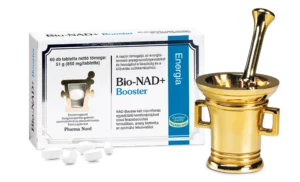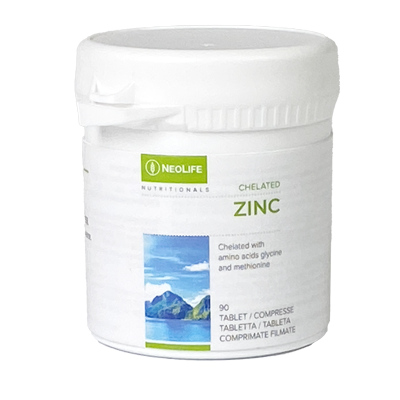Részösszeg:
10.880 Ft
“Pharma Nord Bio-NAD+ Booster” a kosárba helyezve. Kosár
Chelated Zinc
7.020 Ft
A cink számos életfunkció normál működésében tölt be fontos szerepet. A cink hozzájárul az immunrendszer normál működéséhez és a sejtek oxidatív stresszel szembeni védelméhez. Hozzájárul a normál bőr, a köröm, a haj normál állapotának fenntartásához, szerepet játszik a kognitív funkciók és a normál látás valamint a normál termékenység és szaporodás fenntartásában.
A NeoLife cink-kelátot tartalmazó terméke kiemelkedően tiszta és hatékony cinket szolgáltat, a két aminosav kelátnak – a cink-biszglicinát és a cink-metionin – köszönhetően, jelentősen több cink szívódik fel.
sf-ch-zinc
Leírás
Miért a cink?
- A cink hozzájárul a normál DNS szintézishez.
- A cink hozzájárul az immunrendszer normál működéséhez és a sejtek oxidatív stresszel szembeni védelméhez.
- A cink részt vesz a makrotápanyagok normál anyagcseréjében, beleértve a szénhidrátokat és a zsírokat is.
- A cink hozzájárul a vér tesztoszteronszintjének normál fenntartásához, így szerepet játszik a normál termékenység és szaporodás fenntartásában.
- A cink részt vesz az A-vitamin normál anyagcseréjében és hozzájárul a normál látás fenntartásához.
- A cink hozzájárul a normál szellemi működés fenntartásához.
- A cink hozzájárul a normál csontozat fenntartásához, a haj, a bőr és a köröm normál állapotának fenntartásához.
- Mivel a legjobb étrendi cinkforrás a hús és a tenger gyümölcse, a vegetáriánus és a húsban szegény étrend jóval kevesebb cinket tartalmaz az ajánlott napi mennyiségnél és általában felszívódást gátló faktorokban gazdag.
Miért a NeoLife Chelated Zinc?
- Kiemelten tiszta és hatékony. Gyógyszer minőségű magas tisztaságú cinket tartalmaz, ezért jól hasznosul.
- Kelátok a jobb felszívódásért. Az exkluzív kelátképzési eljárás optimalizálja a hasznosulást és csökkenti az emésztőrendszerben kialakuló esetleges irritáció kockázatát.
További információk
| Gyártó | NeoLife |
|---|---|
| Kiszerelés | 90 tabletta |
| BIBLIOGRAFIA | 1. EFSA FEEDAP Panel. Scientific opinion on safety 2. Gandia P. et al. A bioavailability study comparing two 3. Rosado J.L.et al. Absorption of zinc sulfate, 4. Solomons N.W. Dietary Sources of Zinc and Factors Zinc Metalloenzymes. Biochemistry (2014), 53, 6, pp 6. Zhu K-X. et al. Isolation and characterization of |
Csak bejelentkezett és a terméket már megvásárolt felhasználók írhatnak véleményt.








Értékelések
Még nincsenek értékelések.